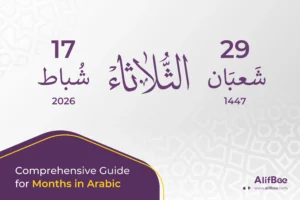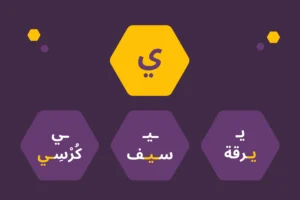Why Learn Arabic Vocabulary?
Mastering any language starts with building a solid vocabulary. For beginners, learning new words is often the first step on their language journey. A growing vocabulary boosts comprehension and broadens the topics learners can discuss and write about, enriching their communication skills.
More specifically, many beginner learners wonder how to increase Arabic vocabulary so they could advance to more fluency in speaking the Arabic language.
Is Learning Arabic Vocabulary Easy?
Memorizing Arabic vocabulary can feel challenging, and many learners get stuck on long word lists, hoping to learn them before speaking. This approach can slow progress, creating unnecessary barriers to fluency.
In this article, I’ll share seven effective strategies for building your Arabic vocabulary. These methods make it easy to acquire, practice, and retain new words and phrases so they’re always at your fingertips when needed. Most of these strategies I use personally in the classroom with my students and they have proven to be effective to me improving my English language and to many others learning languages in general.
1. Read, Read, Read
As I always tell my students, reading is the most effective way to build your vocabulary. It helps you learn new words in context and allows you to encounter them naturally as they appear throughout the text, making the learning process almost effortless. Additionally, reading keeps you engaged and motivated, helping you stay committed to expanding your vocabulary. You’ll unconsciously absorb some words and consciously learn others while reading about your favorite topics.
When selecting what to read, choose topics that genuinely interest you. Take notes on new words and expressions: what they mean, how they’re used, and any personal insights to help you remember them better. I will recommend two sources for reading in Arabic: Arabic Ba & Aljazeera Learning Arabic. Both provide diverse reading materials tailored to learners at various levels, allowing you to explore a range of topics while building your vocabulary and understanding of the language.
Arabic Ba offers structured content specifically designed for learners, with clear explanations and exercises to reinforce new vocabulary. Aljazeera Learning Arabic provides authentic articles, news, and stories, which expose you to real-world Arabic, helping you improve your reading skills and understand how words are used in different contexts.
2. Learn Vocabulary through apps
Another great way to learn and consolidate new Arabic words is through apps. There are many Arabic vocabulary apps that teach words and phrases through gamified exercises, which make learning new vocabulary enjoyable. These apps also help learners commit to a consistent learning routine. For example, they send reminders to review newly learned words and encourage learners to maintain progress streaks. A steady learning routine ensures that learners will continue building and practicing their vocabulary, preventing setbacks in language acquisition.
Apps like AlifBee offer these valuable features to Arabic learners. AlifBee provides an engaging, context-based learning approach, allowing users to learn new words across various categories and topics. With ten difficulty levels and fresh vocabulary introduced at each stage, learners can steadily progress in their language journey.
3. Learn through courses
This is one of the easiest and fastest ways to learn new vocabulary. It’s also one of the most reliable methods. You will have a mentor or an Arabic teacher to guide you, explain difficult words, clarify confusing expressions, and ensure proper use of newly learned vocabulary. More importantly, many Arabic courses include interactive activities like group discussions, role-playing, and language labs. These activities encourage active practice, helping learners quickly internalize new words through practical use.
At AlifBee, we offer online Arabic courses taught by experienced teachers through private, one-on-one sessions. The courses have flexible scheduling and a structured learning journey with predetermined objectives and fixed durations to help students achieve their language goals. You can take AlifBee courses to learn new vocabulary within a broader plan to improve your Arabic.
4. Note down new words in detail
Taking detailed notes is a highly effective way to retain vocabulary. When you encounter new words while reading or listening to Arabic, don’t just jot them down—include definitions, examples, antonyms, translations into your native language, and any other details that help you feel comfortable using the word accurately.
Note down the word class of every new word and learn word families. This helps you use new Arabic vocabulary in the right place in a sentence. Check the following table for the Arabic verb كتب (to write) as an example:
Word Root ك - ت - ب
English
Transcription
Word Class
Arabic
letter
Maktwb
Noun
مَكتوب
library
Maktabh
Noun
مَكتَبة
writing
Kitābah
Noun
كِتابة
to write
Kataba
Verb
كَتَبَ
book
Kitāb
Noun
كِتاب
writer
Kātib
Noun
كاتِب
5. Practice new words
“Use it, or lose it!” You need to keep practicing new words so you don’t lose them. You can try to put them to use in your everyday conversations. Alternatively, you can practice through exercises on learning apps.
Another great approach is to write short paragraphs or journal entries using the new words you’ve learned. This helps you see how they fit into different sentence structures and contexts. Regularly reviewing your notes and flashcards can also help strengthen retention. The key is to consistently engage with the words, ensuring they become part of your active vocabulary over time.
6. Use new words in familiar examples
What is the best method if you are looking to use new words? You need to put new verbs, nouns, or adjectives in sentences that describe you, your life, achievements, plans, intentions, etc. Using words in personal examples allows you to fully understand the correct context for using them.
For instance, if you’re learning the Arabic word سافر or “travel,” try using it in a sentence about your own travel experiences or plans. Personalizing vocabulary helps anchor the meaning and ensures it sticks in your memory longer.
In addition to creating personal sentences, try speaking aloud or writing short stories about your day, using the new vocabulary. This can further reinforce the words and help them become part of your active vocabulary, ready to use in conversation or writing.
7. Use flashcards
This is a classical method that always works and never gets old. It helps reinforce memory through repetition and active recall. Write the Arabic word on one side and its meaning or translation on the other. Organizing your flashcards into categories such as food, emotions, places, or verbs is also a good idea. Especially for beginners, it helps to write the Arabic script and the transliteration (e.g., “kitāb” for كتاب). This can assist you in learning how to pronounce words correctly while familiarizing yourself with Arabic writing. Most importantly, review your flashcards daily or a few times a week to keep the words fresh in your memory.
Arabic Vocabulary Building Tips
- When you learn new Arabic vocabulary, remember to check how these words are pronounced. Learning to pronounce arabic words is essential for correct speaking and intelligible communication.
- An Arabic language coach can help you with pronunciation. At AlifBee, we have highly skilled coaches to accompany you in their Arabic learning journey and provide support and assistance with pronunciation and any other difficulties you might have when you are learning Arabic. (Learn more in this blog: Why You Need an Arabic Coach Today)
- Learn new vocabulary from Arabic vocabulary books like Practice Makes Perfect: Arabic Vocabulary from McGraw-Hill Companies.
Final word
Keep in mind that vocabulary can’t be acquired without constant exposure to the language and daily practice. New words will quickly be forgotten if you don’t use them regularly. Feel free to choose any of the tips in this post that suit your schedule, interests, and unique learning style.
Let the excitement of discovering new topics through reading, listening, and speaking motivate you as you advance to more complex Arabic words and phrases.
The journey of a thousand miles begins with a single word.
See you next time!








